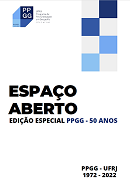Thirty Years of Political Geography at the PPGG: Balance and Perspectives
DOI:
https://doi.org/10.36403/espacoaberto.2022.55027Keywords:
Political Geography, PPGG, GEOPOLAbstract
This text treats the experience of thirty years of political geography in the PPGG up to the time of its 50th anniversary. The freedom of student to choose the thematic grid of the courses to take and tolerance between colleagues in the program over time has opened the possibility for professors to define new content for their fields of knowledge using different theoretical, conceptual and methodological approaches. This academic pluralism in turn permitted developing lines of political geography informed by conceptual bases of politics, taken here in their theoretical, institutional and empirical sense. The theoretical approach of political science as a guide for political geography led to themes, authors, theoretical discussions and research that, surprisingly, had affinities with those of geography and made it possible to expand the scope of analysis and debates in the discipline. The creation of GEOPPOL (Group of Studies and Research on Politics and Territory) strengthened political geography in the program, attracted students and trained professionals who today work in different institutions and are present in universities throughout the country. Most of the theses and dissertations produced were published and became references for students from other post-graduate programs. From the PPGG and GEOPPOL a network arose connecting colleagues doing research in political geography in states of the Northeast Region (Pernambuco, Paraíba, Bahia and Ceará), in Brasília, at the UnB and at the Ministry of Science and Technology, in Paraná and in institutions of Rio de Janeiro.



